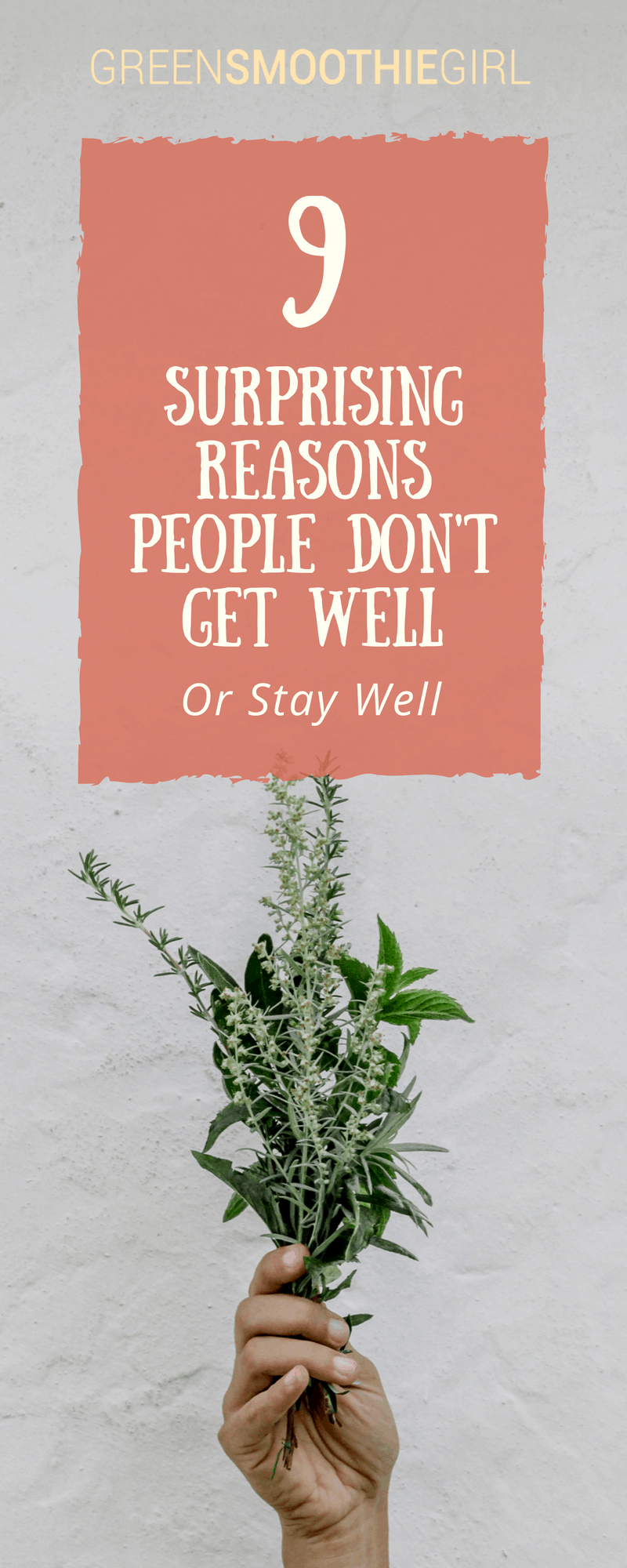9 Surprising Reasons People Don’t Get Well, Or Stay Well

In the 25 years since I learned how to get healthy, and then did it--I’ve never stopped researching.
I even went on a global investigative tour of 19 holistic wellness clinics. And I continue to write about what I learned about how people get well.
In that research tour, and my 450-city, 6-year speaking tour, I met a lot of people who are very ill.
Almost always, they immediately want to tell me all the things they’ve done, to try to solve their health problems. They are looking for answers.
The more I research the scientific literature, and talk to people who are happy, and people who are miserable, the more I uncover surprising, powerful reasons why we’re sick. Addressing them can be key, to get well.
In this blog post, I share with you 9 significant but often-overlooked reasons I believe people get sick, and stay sick.
1. Addictions have you by the throat.
It’s not your fault you’re addicted to...well, everything.
Big food manufacturers like Pepsi and Frito Lay organize focus groups to test the “sweet spot” for exactly how much refined sugar, refined salt, and even neurotoxic seasonings like aspartame and monosodium glutamate, provoke people to eat maximum amounts of their product.
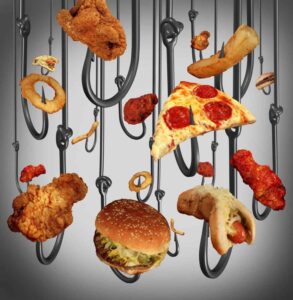
Big food manufacturers test the “sweet spot” for exactly how much refined sugar, refined salt, and even neurotoxic seasonings provoke people to eat and drink maximum amounts of their product.
Literally, millions of dollars are spent to figure out how to get you to eat more.
But even though it’s not your fault they have your number—only you can get yourself free of the addictions.
You’re the only motivated party, in that relationship you have with the processed food--or alcohol, tobacco, or painkiller--industries.
One very hopeful fact is that your ancestors ate virtually no processed sugar, until the past few generations—and your body is actually programmed to resonate with the higher-frequency foods, such as colorful fruits, vegetables, legumes, nuts and seeds.
When you go completely cold turkey off all sugars and refined salt, for even four days—I'm talking about all processed food—while those first four days can be very difficult, what happens next is very exciting.

In my favorite book I’ve ever authored, The Adventures of Junk Food Dude, we explore how our tastes completely change, in just four days off sugar.
Are you open to story time? I read a story, from a children’s book, to over 100 adult audiences, on my lecture tour, and they loved it.
In my favorite book of the 15 titles I've authored, The Adventures of Junk Food Dude, we explore how our tastes completely change, in just four days off sugar.
Does that seem too simple, to possibly be truthful?
It’s not. Sugar, according to several animal studies, is more addictive than cocaine. (In animal studies, unlike human studies, ethically, you can put both cocaine and sugar in a dispenser, and let the rats go for it.)
And, once you’ve been pressing the lever, for a dopamine rush of sugar (or fried foods, or alcohol), you’re far more likely to press it again, and again. And again.
But your neurological system regains control, in a surprisingly short period of time. My informal research has led me to this surprising fact:
Most people have never, not once in their lives, gone four days without refined sugar.
In fact, most people don’t even know when they’re eating foods full of sugar, and salt.
Why? Food is so easy, these days, that there’s little effort to get it, little effort to eat it—and we expend correspondingly little effort to be mindful of what’s in it.
Try it. Go off all sugar for four days. Let the magic happen.
If you’re up for a full 26 days without sugar, eating only whole foods, to completely reset your metabolic system, check out my free detox video masterclass.
It’s a shortcut, to my 20 years of research in how to get our energy back, lose weight effortlessly, and rebalance the hormonal, immune, and digestive systems.
2. You’re taking advice from the “sick care” specialists, instead of the wellness experts.
“My doctor says…” is how I’ve found most people start a conversation about their health.
A small but growing minority of health care practitioners are moving into “functional medicine,” a movement to diagnose, and then treat, the root cause of disease. Functional doctors treat a patient holistically, and preventatively, with treatments that do no harm.
With treatments that resolve problems, rather than masking symptoms.
But the vast majority of the billions of dollars we spend on health care, these days, goes to the complex of M.D.’s who are trained in sick care. That is, if your body is in auto-immune crisis, rather than find out why your thyroid or adrenals are failing--they give you a drug to mask the symptoms.
If you have a tumor, they’ll direct radioactive rays to burn it. Or they’ll inject chemicals in your veins, to poison it—and hope the rest of your body survives the treatment.
What they don’t do is examine why your immune system stopped metabolizing cancer cells in the first place. Or how exposure to toxicity may have caused a serious weakness in the organ where cancer started.
While you might feel better in the short term, if you’re taking the prescriptions from the medical complex run by M.D.’s, you still have a problem.
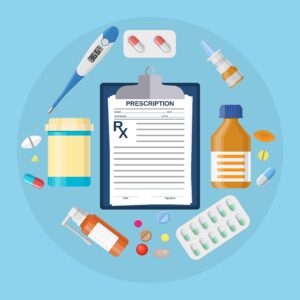
Masking the symptoms with drugs is like putting duct tape over the engine light signal in the dashboard of your car. You can’t see it any more—but your engine is still in jeopardy.
Masking the symptoms with drugs is like putting duct tape over the engine light signal in the dashboard of your car. You can’t see it any more—but your engine is still in jeopardy.
I don’t mean to disparage doctors, because they’re great at what they were trained in.
They might do the same surgery, three times a day, for 20 years—and they’re the right person for the job, if you need a triple bypass, or a Lasik procedure, or a joint replacement.
They won’t be able to help you recover your cardiovascular health, or stop losing your eyesight, or rebuild connective tissue. They don't know anything about nutrition, or how to be healthy. Medical school didn’t cover any of that.
They may know their diabetic meds, and be able to teach you how to monitor your blood sugar levels, and adjust your insulin.
What they don’t know how to do, is heal your endocrine system.
So, the best person to have in the driver’s seat of your car, is you.
Getting educated from the best books about human health, and being guided by a very experienced functional-medicine practitioner, is a great idea.
3. You think the latest fad diet will save you. (Because you’re confused about what ‘eating healthy’ really means.)
When one of my readers talks to me about their diet, in growing numbers, they tell me what diet fad they follow. This trend is alarming to me.
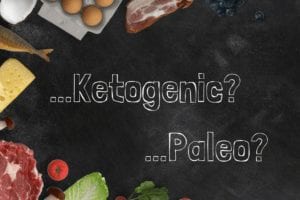
Ditch the diets. Don’t be afraid of carbohydrates. (Eat the complex, whole-foods versions, like fruits, whole grains, and legumes.)
“I eat Paleo,” they’ll say, or “I’ve been doing the Ketogenic diet, the past several months.”
If you think that “eating Paleo” or “eating Keto” means “good nutrition,” you’re not alone. Today’s generations have followed so many diets, that they don’t know that a healthy diet doesn’t require them to count their grams of carbohydrates, or avoid some of the food classes people have been eating for literally millions of years.
Ditch the diets. Don’t be afraid of carbohydrates. (Eat the complex, whole-foods versions, like fruits, whole grains, and legumes.)
Don’t buy into the silly idea that “protein” is found only in animal foods, or that you have to maximize your protein intake.
Stop counting calories. Don’t avoid healthy fats found in whole foods—and don’t overeat them, either.
When I opted out of the medical complex, the meat-and-dairy complex, and the processed-food complex—three of the wealthiest industries in the history of the world—I got my health back.
And the hundreds of books and research papers I studied, gave me clarity that has helped me steer clear of confusing my body, disrupting normal metabolic processes, yo-yo dieting and radical changes of diet, year after year.
I feel like I literally got off the roller coaster. The Cliff’s Notes of what I learned can be found in my 12 Steps to Whole Foods Video Masterclass, which I now share with you, for free.
4. You rely on supplements, and underestimate the power of your dietary choices.
So many of us think that health is found through taking supplements. If you’re new on the journey, you may be looking to nutritional supplements, rather than to pharmaceutical drugs. That’s an important first step. Being aware of the destructive effects of chemical drugs, and realizing that they don’t solve underlying health problems.
But too many of us are refusing to address the very foundation of our diet. No handfuls of supplements can cover for a deficient diet.
You see, while I may be able to make a synthetic version of one of the amino acids that could help you see better, or may play a role in a mood disorder, no scientist has been able to put, in any pill, what is found in the magical, synergistic foods that grow on trees, and in the ground.
(When people ate those, we didn’t have an epidemic of depression and anxiety. Or diabetes, obesity, and cancer.)
These types of food have soluble and insoluble fiber, that is stripped out, when a supplement company makes it into a pill.
Any given nutrient works in concert, with potentially hundreds of other nutritional compounds, for optimal human health. Science has less information than you may think, about the elegant way that whole foods support slow aging, living without symptoms and disease, and enjoying energy from early till late, every day.
If you’re taking a lot of pills (of any kind) and not getting well, ask yourself if the foundation of your diet (90 percent of it or more) consists of greens, vegetables, fruits, legumes, whole grains, nuts and seeds.
These are the foods that human beings ate, before the epidemic of cancer, heart disease, and auto-immune conditions.
I take supplements. Vitamin D, for instance, is very hard to come by, where I live--where the sun doesn’t shine long enough, or it’s too cold to go outside, for six months of the year. And low Vitamin D levels may be more correlated to high cancer risk, than any other factor.
I also take fulvic and humic acid, found in ancient plant deposits--the most bioavailable source of all 90+ minerals needed, for every transaction in the human body, in a world where soils are depleted.
And I experiment with supplements, for various reasons, on a regular basis. I do so after carefully educating myself, because you can overdose on many supplements, and you can do harm, with the wrong dosing or the wrong supplement.
Science is exploding with natural antibiotics, natural anti-inflammatories, and more. They can be powerful.
Use supplements, but don’t buy into the mindset that with supplements, your diet doesn’t matter. Nothing could be further than the truth.
5. You underestimate the effect of your “natural emotional state” on being physically healthy.
One of the most important findings, in functional medicine in recent decades, is the fact that unmetabolized, low-vibration emotions can seem to “play on a loop” for those affected by anxiety and depression.
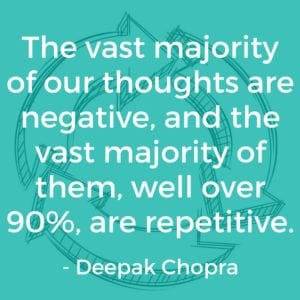
Being “stuck” emotionally can affect our ability to get well and stay well.
Being “stuck” emotionally can affect our ability to get well and stay well.
Pretend we’re sitting at your kitchen table, and I’m asking you a question. Answer the truth.
Don’t think about it, just answer:
“What is your natural, default emotional state?”
If “happy” (or something like it) wasn’t your quick answer, the good news is, there’s much you can do, to turn that around.
Tapping the higher vibrations, to stay out of a funk, regardless of circumstances, is the subject of my most recent book, Vibe: Unlock the Energetic Frequencies of Limitless Health, Love & Success.
I wrote the book, after 50 years of finding my way out of a childhood of abuse, and many difficult circumstances, including divorce after 20 years, and several big failures—and achieving a life that by any standards, is really wonderful.
But if you’re happy, naturally, but sometimes struggle? Becoming mindful, and finding ways out of that state, quickly, can completely transform your health—both physical and emotional.
Women who “stuff” their emotions are more prone to breast cancer.
People who are angry or fearful, regularly, are more likely to have heart attacks and strokes. People who cannot forgive, and hold grudges, have mysterious physical symptoms, that often resolve, when that “stuck energy” is released.
While this way of thinking isn’t particularly mechanistic, and not easily decoded, we are holistic beings, and our physical health affects our emotional state, and vice versa.
Thirty years ago, the “helping professions” used mostly talk therapy, to get to the root of your misery, anxiety, depression, fear, anger, and inability to forgive.
The psychological interventions, from Freud to Gestalt to Behaviorism, weren’t particularly effective. Insurance companies even refused to pay for most of it, due to lack of efficacy of most talk therapy.
Most people in therapy didn’t get better, although the patient became more aware, and couples started communicating, with an intermediary--which can start a change process for many.
Now bioenergetic interventions and neurofeedback training, EMDR interventions even in mainstream psychotherapy, and various forms of “energy healing” are having remarkable results in allowing us to emotionally heal, which facilitates physical healing.
If you eat a clean, disciplined diet, but you’re stuck on “replay” with your childhood of abuse or trauma, or can’t release resentments from how others have wronged you, I hope you’ll consider whether this is an area to focus on, in recovering from a physical illness.
After all, there really is no clear distinction between our spiritual, mental, emotional, and physical health.
6. You don’t stick to your plan long enough.
The half-life of a new diet, a new cure-all, a lifestyle change, has never been shorter. As soon as you read Guru X’s book, Doctor Y comes along, publishing a competing philosophy.
In the age of media-24/7, you’ve got a lot of noise, competing for your attention--and we’ve all developed a bit of Attention Deficit Disorder.
You’re on to the next fad, quickly, not seeing the healing process through, that takes place from committed dietary and lifestyle changes.
How many programs or ideas resonated with you, but after some quick wins for a few days or weeks, you fell off the wagon, and didn’t get back on again?
It takes time, to learn new recipes, new shopping habits, and truly commit to a whole-foods program. This is required, to get you out of a life dominated by symptoms and fear. Each recipe you discover, that is delicious to you, as well as healthy, is an important step on the journey.
It took you a long time, to end up with poor health, and the “long play” of getting your health back means that you must stay in your program, until it becomes habit, and sustainable.
Even “two steps forward, one step back” is true progress. (No one’s perfect, and even if you decide to eat a 95 percent whole-foods, mostly plant-based diet, you might slip, now and then.) But don’t let that be a reason to quit.
Have a vision in mind of how health is rebuilt--one habit, one recipe, at a time. Replacing 10 dishes you currently eat, with 10 new, healthier dishes, can be a totally game changer.
You start with the first one. Then the second one is easier, and the third is easier still. Remember that old principle of physics you learned in high school:
Bodies in motion tend to stay in motion.
It’s never too late to make small changes that lead to big wins, for your health.
7. You don’t break a sweat every day.
Everyone knows that exercising, for the sake of your cardiovascular health, and disease risk, is critically important.
What you may not know, in the age of Crossfit and ultra-marathons, is that more evidence is coming to light that more isn’t necessarily better.
Even going for a 30-minute brisk walk, six days a week, is powerful, in lowering your disease risk. And pushing the body through “extreme” sports such as marathons, comes with its own set of health risks.
Even slightly overweight people who exercise regularly, may have lower morbidity rates, according to new research, than thin people who don’t exercise.
So, don’t hold the bar so high that you think that if you don’t have time for an hour on the Stairmaster, you might as well not do anything.
For some, with stressed adrenals, regular yoga classes may be just the right type and amount of exercise.
Listen to your body, and do what you can. But whatever you do, don’t be sedentary. Your spine compresses, and combined with the stress many of us face, in our work and our lives, you put yourself at unnecessary risk.
Going for a walk lets you breathe clean air (oxygen!), get some sunshine on your skin (Vitamin D!), and lifts your spirits, in addition to increasing your fitness level.
And for those who aren’t able to be mobile, an infrared sauna can passively achieve many of the benefits of exercise.
Or a vibrational plate you stand on, for 15 minutes a day, can cause trillions of muscle fibers to fire, and raise your vibration in many ways—you’ll notice the difference, after doing any of these easy habits for just a few days.

Small bursts of exercise increase oxygen to the brain, which makes you sharper and more productive.
Get up from your desk, once every 60 minutes, and do 20 sit-ups, jumping jacks, pushups, or squats—because small bursts of exercise increase oxygen to the brain, which makes you sharper and more productive.
Some evidence suggests doing this for a total of 20 minutes a day, in short increments, may outweigh the benefits of a 60-minute jog!
We are the only people, in the history of the world, who go entire days with very little movement. It’s unnatural, it’s a big contributor to the anxiety and depression epidemic, and the solutions are easy, and varied.
8. You haven’t learned a healthier way of being “in relationship” with others.
The old schools of psychology held that an emotionally healthy human being was one who was “independent” of others, and didn’t rely on parental figures, friendships, and intimate relationships.
The newer science of attachment theory has yielded dozens of published papers proving that nothing could be further from the truth. We “bond” with our mothers not just because they provide us nourishment, but because we are fundamentally, innately tribal creatures who need companionship and love from those around us.
Needing others doesn’t make us “needy”--it makes us human.
And when our closest relationships are “toxic,” trapped in cycles of criticism, shaming, neglect, or silence, we suffer. Walling ourselves off from the pain of difficult relationships isn’t the answer.
Yes, babies who can “self soothe” are happier babies. But babies without human touch, eye contact, and affection, have poor outcomes as older children and adults. In orphanages, they sometimes die.
Many of us default into the unhealthy patterns we observed in our parents, and the “dysfunctional family” may describe many or even most of our early-life experiences. But research shows that even having a flawed family is better than having no family.

Many studies now document that those with furry pets have lower blood pressure and fewer heart attacks.
Relationships with pets can help fill the void, for people who have few relationships. I work fulltime from home, the past 10 years, and my last child is about to fly the coop. Having my cat in my lap, while I work, and someone to talk to, when my “virtual” relationships aren’t enough, gives me energetic connection to living beings that helps me feel grounded and connected--until “girls’ night out” on the weekends, or my next work or vacation trip with friends or family.
Many studies now document that those with furry pets have lower blood pressure and fewer heart attacks.
Physical touch is important, and if you aren’t in an intimate relationship, the energy exchange from a professional massage can also help fill the bill. We literally exchange electrons with any kind of positive physical touch. So, hug people more often—the big, long, bear-hug type of embrace.
Seeking out group experiences, and new friendships, can be difficult in mid-life, or when we’re feeling socially isolated—and many of us do, in the digital age when most of our interaction with others is online.
But it’s also a part of whether we’re physically healthy, or not.
Join Meetup, and you’ll find a group in your town based on almost any interest you might have. A face-to-face interaction with another person is far healthier than a text thread.
And above all, solve, or eliminate, relationships that cause you chronic suffering. It’s okay to limit contact with a relative you’ve sought resolution with, but cannot achieve despite your best efforts.
(Owning your part in relationship troubles is also highly beneficial to your health. After all, when you’re accountable, you’re also empowered, and change is possible. You can’t change their behavior and feelings, but you can change yours.)
And seeking out, and spending time with, people who inspire and encourage you in your goals, is one of the most important things you can do, as you seek a healthier life.
The best way to learn if someone is an encourager, the type who can be “wind under your wings?” Make a concerted effort to be the wind under theirs.
These are three proven keys to healthy relationships:
A. Set boundaries. Boundaries don’t have to be ten-foot brick walls. Some healthy boundaries are semi-permeable.
I go to family events with a parent who was abusive and destructive to my self-concept, for the earlier decades of my life. I honor her for giving me life, I’m polite to her, and I do not engage in arguments or conflict—but that doesn’t mean I have to have sleepovers or invite her out with my girlfriends.
Setting boundaries I am comfortable with has led to peaceful co-existence with others, because some people I spend a lot of time with, some people I spend a little time with, and some people, I give myself permission to spend no time with.
B. Communicate clearly and effectively. No one knows your needs, unless you express them.
What your family member or friend does, with that information, is their prerogative, but finding a neutral tone to express how you feel, in “I” language, rather than provocative “you” language, just might help you feel understood, and turn a corner in the relationship.
Expressing yourself when you’re angry, isn’t effective, and can cause additional damage to a strained relationship. When you can revisit an issue, when you’re feeling calm and clear, however, can lead to breakthroughs in even very difficult relationships.
C. Be willing to end toxic relationships.
People trapped in “toxic” relationships are also at higher risk for many diseases.
Amy Poehler’s autiobiography says, “I don’t consider a ten-year marriage to be a failure.” While many would take issue with that, and our culture highly values marriages that last “till death do us part,” some relationships have a natural end.
This can apply to friendships, as well. All relationships can be instructive. And since we are only one of two parties in any relationship, we can’t always control whether they continue, or end.
When we find the gift and learning opportunity in every relationship, then the end of a relationship can be an opportunity to forge new ones, and move forward in peace.
No one maintains every relationship they’ve ever built--and while working through problems is highly valuable, in some cases, “letting go” is the right thing to do, for the sake of your health.
9. You don’t have meaningful work, giving you “life purpose.”
Many people think of work as a chore, and something you just plow through, till quitting time—then, and only then, can you be happy. “Happy hour” starting at 5 p.m. was built on this concept!
But the happiest and healthiest people are those who have meaningful work. And over 80 percent of Americans report that they don’t have their “dream job,” or even particularly enjoy their work.
You don’t have to be a doctor, psychotherapist, kindergarten teacher, or a mother of babies, to love your work.
You do have to feel like your creativity and contribution is valued, you are compensated fairly for your work, and you look forward to doing it.
“Flow states” have been studied, for several decades, as one of the highest-vibration states of the human being. This is where you may lose track of time, a crowbar couldn’t separate you from the task you’re immersed in, and you have extraordinary satisfaction not just in the paycheck or work product—but in the process itself.
Do you experience it, on a regular basis? After reading Mihali Csikszentmihalyi’s book, Flow, over 20 years ago, I began to tune into when I tap that state of high-frequency creation and productivity.

Playing tennis is one of my "flow states," so it's one of the activities that I seek out as often as I can.
I find flow states in my life most often, doing three things: (1) when I’m writing or speaking (most of what I do, in my job), (2) when I’m playing tennis (my favorite hobby), and (3) when I’m deep in a conversation with someone I connect with.
So, I now seek those activities out. While I run a business with 22 employees, and some tasks (such as reviewing spreadsheets) do not light up all the pleasure centers, I find ways that research and writing can benefit my influence with others, and my business in general. Because I love it.
If you aren’t in a career that meets these objectives and give you a sense of purpose, remember:
People change careers several times, in a lifetime. It’s not impossible. Create an intention to watch for-- and act on--opportunities. Verbalize your career hopes, to those around you. Ask boldly for opportunities. Sometimes the answer will be yes.
And magic will begin to happen.
Remember, people with life purpose are happy, healthy people.

Disclosure: This post may contain affiliate links that help support the GSG mission without costing you extra. I recommend only companies and products that I use myself.
Posted in: 12 Steps To Whole Food, Detox, Exercise, Holistic Care, Lifestyle, Natural Remedies, Tools & Products




